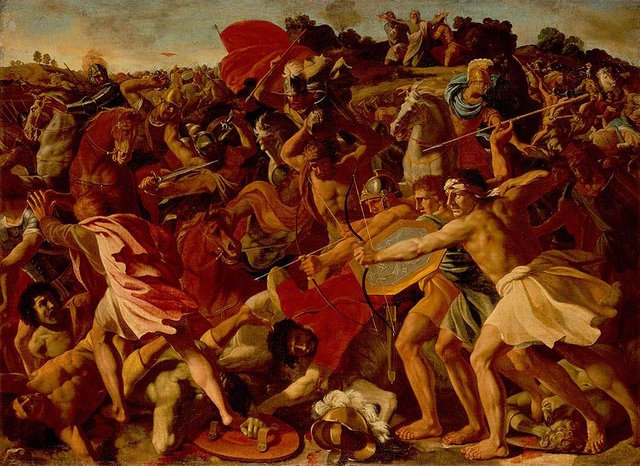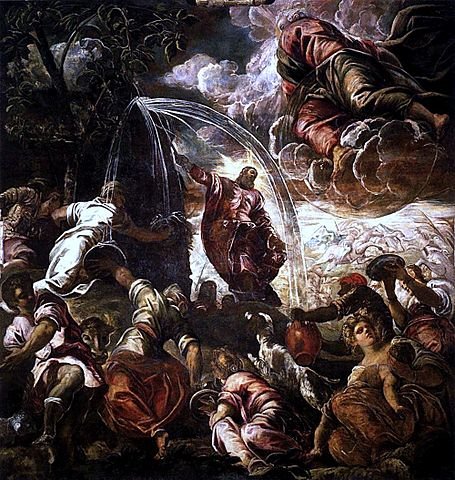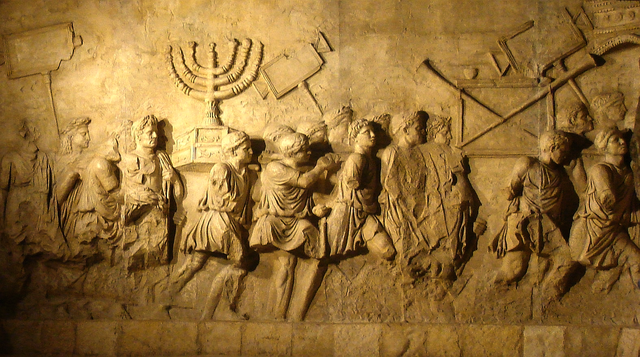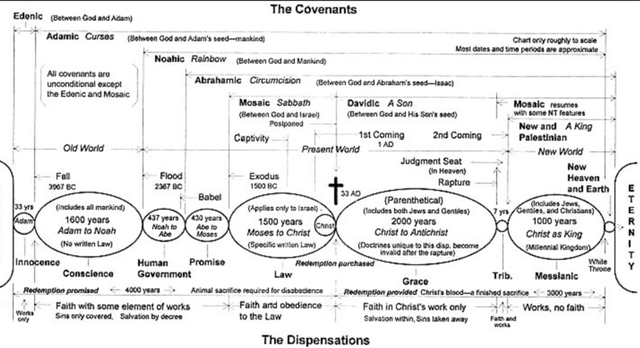What's Up With the Old Testament? i. (Christian Anarchy - Part 6)

Kings, judges, war, slavery, conquest, and a whole bunch of really, really bizarre laws. What is up with the Old Testament? Or more specifically - How can a Christian anarchist deal with it?
Welcome to my series on Christian Anarchy! If you're new, you should know that you're joining me near the end. If you want to start at the beginning, here are the links:
- Can a Christian be an Anarchist?
- All Christians Should be Socialists
- What Does the Bible Actually Say About Government?
- Render to Caesar That Which is Caesar's
- Can a Christian be an Anarchist Without Rejecting Paul?
As you can see from the title this is part i. of my exploration of the Old Testament. In this article I will look God's Kingdom on Earth - the Kingdom of Israel. Tomorrow I will write about God himself and his actions as King in the Old Testament.
How Can God Have a Kingdom on Earth if the State is Inherently Immoral?

You're asking some hard-hitting questions. Let me break it down for you.
- Why is the state inherently immoral?
Because all men are created as equals under God. If we are equal, then none of us have the right to force our will upon (rule) another, nor can any person gain that moral right through ceremonies, elections or any human rituals. This is just basic logic.
- Is there no way a person can be given authority over another?
If there is a supreme being who created everything, he would have legitimate authority over the things that he created. As Christians, we believe that describes our Triune God. If God is the ruler of all things, he would have the right and the power to appoint representatives on earth as rulers.
The Unique Case that was the Nation of Israel
At it's inception, Israel had no king except The Lord. They did have leaders like Moses and Joshua as well as the religious authorities who were meant to carry out God's will for the people. These people were not rulers in and of themselves. They could not act autonomously. Their only job was to be a "mouthpiece" for God. When Moses carried out his own will instead of following God's instructions, God showed him who was really in command.
12 But the Lord said to Moses and Aaron, “Because you did not believe me, and because you did not honor me as holy before the people, you will not lead them into the land I will give them.”
13 These are the waters of Meribah, where the Israelites argued with the Lord and where he showed them he was holy.
Numbers 20:12-13 (ESV)

It was not until later that Israel demanded a king. They weren't satisfied with God's leadership and wanted a man to lead them. And if you've been reading this whole series, you'll remember God's harsh words about human government in response to this request.
But Israel didn't heed that warning, so God gave them what they wanted. He passed on authority to an earthly king despite the fact that it would lead to pain and destruction. Sometimes that's how God works - he gives people exactly what they want. That can be the ultimate punishment.
That's a very brief and very incomplete history of the Nation of Israel, but it's just enough information to build on for the rest of the article.
Israel was unique.
There is no other point in Scripture before or after Israel where we see God creating a nation on earth, binding that kingdom with laws and passing the right to rule onto earthly leaders.
Why Did God Create a Nation?

Scripture must be read in the context of Scripture. The history of Israel is just one piece of a greater narrative.
On it's own, Israel did serve some purposes. It was created to be a light to the people living within its borders and to the surrounding nations. The world was (and is) a mess and Israel's laws and culture were an incremental improvement on that mess.
In his book Is God a Moral Monster? Paul Copan writes about the nation's purpose more articulately than I ever could.
The Old Testament reveals a God who has a global (cosmic) plan and who involves humans as history-shaping participants in that plan. Yes, humans matter. The Old Testament's genealogies reflect the important role that humans play in the unfolding of God's purposes.
On top of this, the Jews introduced a robust monotheism. Rather than being just on god in a pantheon of others or just a regional deity, Yahweh was/is the only deity who matters. Indeed, he is the only one who exists. Along with this, the Jews introduced a new way to experience reality. There is a divine being who regularly, personally engages humans, whose choices really make a difference. Human decision making has great significance, and God interweaves these choices into his overarching plans. We're not the pawns of fate or at the mercy of the whims of the gods. On the other hand, humans aren't so powerful that they can manipulate God to do their bidding. These themes are some of the gifts of the Jews to the rest of the world.
But if we stop there we won't understand its whole purpose. The Nation of Israel was set up to create a context where the Messiah's arrival would make sense. Israel was bound by the laws of God to show them that in and of themselves they could never reach that perfect holiness that The Lord demanded. Jesus came and freed them/us from the yoke of the law and from our sins.
Jesus' work completes the Nation's purpose.
I'm going to close this section with another quote from Paul Copan:
The Old Testament was in many ways anticipatory of something far greater. So if Jesus truly brought a new covenant for the true Israel [the church] and has begun to renew the creation as the second Adam, then we ought to concern ourselves with how his incarnation, ministry, atoning death, and resurrection shed light backward on the Old Testament, with all its messiness.
... One day we'll fully enjoy the realization of pristine goodness and shalom [peace]. In the new heaven and earth, no social or racial discrimination will exist. Swords will be beaten into plowshares. Peace will reign. In his own day, Jesus reaffirmed Old Testament texts about loving God and neighbor and called Israel back to live by God's creational design.
... While we may stumble or be troubled when reading certain Old Testament texts, we can put them in proper perspective by looking in the right places. The ultimate resolution is found in God's clarifying Word to us and the One who became flesh and lived among us, who died and rose again on our behalf.
Let that serve as a lead in to tomorrow's article where I'll be diving into many of the specific difficulties Christians (and especially Christian anarchists) face when reading the Old Testament.
Thanks for reading. If you liked this article please follow me @sethlinson. I hope you'll keep up with the series for the final few installments.
~Seth
Well done.
One of the views of this long script of history is that God uses it to show in every possible way that man can't govern himself and needs to return to God as his king. Thus, we are often given awful leaders as a form of punishment.
Clarence Larkin made a whole lot of gorgeously detailed graphics, which frequently addressed this topic.

Passing through various covenants and ages of human government humans have tried "innocence", "conscience", "law", "grace", and eventually Christ ruling on earth for 1000 years - with even that Millennial Kingdom ending with one more rebellion.
The message of this history does not point to "everyone did what was right in their own eyes" - it points to "we need Jesus as our perfectly just and benevolent eternal king" who will "rule with an iron rod."
While I agree with every point @alexbeyman makes and think this post is an example of extreme confirmation bias and disagree with everything @stan posts, non-confrontational comments and articles that you disagree with should not be flagged. In fact I do the opposite, if someone makes an effort into posting and presents a dissenting opinion I choose to upvote it. This post did nothing but present his point of view in a respectful way and @stan shouldn't receive downvotes to his reputation score because of it.
Who flagged this and why? Great comment.
Looks like alexbeyman flagged it. He will have to explain himself.
Will I? How will you make me do that?
Alex, are you the guy that flags posts you disagree with? That's not really a great way to get your message across, is it.? I think only a weak minded individual would be swayed by threat of a downvote. I kind of lost some respect for you there.
Who are you to me?
I don't see any flags for this post. All upvotes, sir.
Nice writeup! Being a Christian Anarchist a lot of these questions led me to where I am at today. As long as God is one of free will, it is a religion of peace and free association. And aside from the temple scene with the money changers, Jesus followed the nap.
One of my favorite memes:

Hahaha! I love that
@alexbeyman
Did you flag my post here?
No, just Stan's. He has a history of stalking me on here. It looks like there's a way to see who flagged you by clicking on "votes" under your posts, use that.
On a string at Burger King
Ok, apologies
Ain't no thing but a chicken wing
Hey, fascinating article. I suppose I only have one question left.
Let's suppose there was a group of people traveling around your area today, led by a charismatic speaker who claims the world is ending soon, but he alone can save you IF you sell your belongings, devote your life to him and cut off family members who try to stop you. He'd also like you to leave your home and job if necessary to follow him.
What sort of group is that? Do we have a modern word for it?
Thank you for the clarification, @alexbeyman . I only felt uncomfortable being placed in a category with which I don't fit when you made the overgeneralization. Other than that, your questions were good ones and I hope I provided valuable insight. If not, I will try harder next time. Appreciated. I learned a new word today. Thank you :)
@alexbeyman, your contention that Christianity isn't true hasn't been proven, nor your term "contagious" is a very inviting insight. Both of these would hard to be qualified as arguents, as they aren't supported by evidence.
Yes it has, that's why there are increasingly numerous ex-Christians. There are still Christians because disproving someone's religion makes no difference if they refuse to accept it.
This is why there are still Mormons even though Mormonism, being a much younger religion, is comparatively easy to fact check and makes numerous claims which are possible to flat out disprove by archaeological means.
Likewise, there are still Scientologists despite the fact that it is trivially easy to disprove Scientology's claims of a three trillion year old Earth. If you think people give up religious beliefs that easily, you misunderstand the psychological factors involved.
Contagious may be an inflammatory term in your view, but it is accurate.
Can he back up his claims with miraculous signs, like I dunno, raising the dead?
But point taken. Generally we would call that a cult.
Do you mean like when Muhammad split the Moon in half by pointing at it, then rejoined them a moment later?
You might say "That is only recorded as having taken place in the Qur'an, and no other sources from the period", but likewise with Biblical miracles.
I do take a lot on faith, but it isn't entirely blind faith. If we want to get into a big thing about reasons for my belief that will take a whole other article... or a book.
@alexbeyman
Like I said, this could take articles or books to really dig into some real answers. It's not really something that we can meaningfully discuss in a comments section.
But I will say this. There are independent archaeological sources that do corroborate a lot of the Bible's history. There are independent written sources that do back up some of the Bible's claims. These sources don't help with the issue at hand - miracles. But it's something. And as far as taking the Bible as it's own historical source - there are many other works that we do consider history that have far less existing manuscripts that were written far later (hundreds of years) after the actual events. We have upwards of 25,000 new testament manuscripts. The earliest known sources were mere decades after the actual events.
Although I don't agree with all of the arguments made in this book, a good place to start if you're more curious about where I'm coming from is I Don't Have Enough Faith to be an Atheist by Norman Geisler and Frank Turek.
The Qur'an also contains claims of miracles, like the Bible. Also like the Bible, there exist no independent sources from when it was written which corroborate those claims. Why are Biblical miracles credible, but Qur'anic miracles are not?
Indeed, but the same is true of the Qur'an. If you want to tell a lie and be believed, the way to do that is to mix it into a large amount of truth.
No it isn't, because the miracles are the part we're discussing. The fact that the settings and historical events were real is unremarkable, it's what we should expect of authors wanting to be believed.
Indeed. That last part is crucial because it means it was written within the timeframe that the authors expected Jesus to return, according to his own statements.
I'm not an atheist, so I don't know how much I'd get out of it. Conversely, I recommend you read "Who Wrote the Bible", or basically anything by Bart Ehrman.
To be quite honest, if someone follows their religion, and doesn't mess with me, I'm not going to interfere with their wishes to believe whatever they wish. I mean, what would be the point, as long as whatever they believe in leads them to be an NAP abiding individual?
@alexbeyman
You can't make the claim that all Christians do not abide by the NAP. Those who are trying to live consistently with Scripture will understand that we aren't meant to use the force of law to make people behave the way we want them to. I admit this is a depressingly small number of Christians, but they are there.
Agreed. I'm a Christian and I abide by the NAP. Are statist Christians annoying and harmful, sure, but so are statist atheists and agnostics. The only common factor of people that are annoying and harmful is their involvement with the state. BTW, Alex, what is anarchist shibbollleth.? I am curious as to why you post on a post labeled anarchism if you think anarchism is silly or not your cup of tea... Are you an agitant or just giving some friendly criticism? If criticism, and you want it to be taken legitimately, stay away from dealing in absolutes and general insults. Other than that, I really enjoyed our back and forth.
Defending truth, and the rights/safety of people I care about who are gay.
Well, if they are abiding by the NAP, wouldn't your gay friends be safe? I often see people take direct quotes from the "King James" version of the bible which was translated (mistranslated) by a ruler over men. I have found many inconsistencies that makes following the scripture pretty easy. I mean, Jesus kinda covered that when he made his cast the first stone speech as well as "the golden rule" on the Sermon on the Mount, right?
I don't know what NAP means. If you mean law abiding, up until very recently being gay was against the law because of Christianity. It still isn't legal in every state and in many cases had to be legalized by judicial decision against majority Christian opposition.
There is ongoing legal and social opposition to this from Christian activists, for example arguing that their children should be able to bully gay youth because their religion opposes homosexuality, and frequent calls by Christian public figures to put gays in concentration camps of one sort or another.
There also exist legal "gay therapy" camps Christian parents send their kids to where they are broken down by hard labor and psychological abuse in an effort to make them straight. To date, around 300 have died as a result of this treatment, most of them by suicide after being released.
The nonaggression principle. Not initiating force or coercion.
You would have to ask yourself how much government you want to protect kids from the way their parents raise them then. That is a slippery slope.
Oh, an anarchist shibboleth. Well, Christians in fact do not abide by the NAP. That's a big part of the problem I have with Christianity, and by your own reasoning it warrants active opposition.
Anyways, I'm going to do as I please. Right now I'd like to share some materials with @sethlinson. Unless it is within your power to stop me, we have nothing more to discuss.
https://steemit.com/religion/@alexbeyman/diagram-of-a-memetic-virus
https://steemit.com/religion/@alexbeyman/jesus-predicted-a-first-century-return-that-did-not-occur
https://steemit.com/religion/@alexbeyman/is-evolution-really-compatible-with-christianity
https://steemit.com/spirituality/@alexbeyman/what-can-science-tell-us-about-the-soul
https://steemit.com/religion/@alexbeyman/what-would-you-do-if-scientology-ruled-the-world
That is a fair observation, @sethlinson. However the fact that Christianity is both untrue and contagious is reason enough to oppose its continued spread, as otherwise truth will be consumed and destroyed by it.
@tee-em, shibboleth simply means a word or phrase used by a particular group, but not commonly outside of it, by which members of that group can be identified. It does not imply disapproval. As yet, I've not insulted anybody and don't intend to.
There is a major difference. Mohammed is his own witness. That's a huge difference.
What Jesus did is recorded by eyewitnesses (Matthew, John, Peter, James) and others who either knew him or knew those who did (Luke, Mark). Paul is kind of in-between. Jesus wrote nothing that is recorded in the Bible.
Interesting, not even Josephus, the Jewish historian who lived during the 1st century, refutes the miracles. He even refers to Jesus' resurrection as a fact, though not a Christian. Considering that he was a Jewish captive of the Roman empire, it's a bit odd.
No, not false. My statement stands, and you even backed it up with your comment. Others recording what someone did/said is different than him recording what he did/said/saw.
The accumulation of the canon of Scripture that is our Bible is a long and detailed discussion. But the writers I mention did not set about writing a comprehensive book that they expected to see in one large tome. They each wrote their own accounts without necessarily consulting one another.
The most interesting of these, in some ways, is Luke. He was a doctor and a historian. He didn't write to a large audience. He wrote his account for Theophilus, for some reason that we're not given. Both his volumes (Luke and Acts) directly address this man who appears to at least have been influential, perhaps a Roman governor or senator. Luke also traveled with Paul, so gained more insights into the early church that he recorded.
If you don't believe the miracles, that's your prerogative. However, comparing the authorship of the New Testament , or even the Bible as a whole, to the Quran is a dead end.
False. The Qur'an says hundreds, sometimes thousands witnessed the miracles recorded in it. You might say "That's just the authors claiming that loads of people witnessed those events. That is easily fabricated" but likewise with Biblical miracles.
Re: Biblical authors: A handful of people who wrote a book the purpose of which was to convert other people into Christians. Is that an unbiased source? Why are there no sources outside of the Bible from that time period which corroborate its purported miracles?
As for Josephus: http://rationalwiki.org/wiki/Josephus
There are no sources outside the Bible because the Bible is a collection of all credible sources. If there had been another credible source, it would have been included too.
Indeed, there are some people so convinced they are right that in their mind, anything anybody says confirms their beliefs. But unless you mean to claim Muhammad personally wrote the Qur'an and Hadith...
You appear to be trying to argue that the authors of scripture corroborate one another and that this counts as extrabiblical corroboration of Biblical claims. Do you see what's wrong with this reasoning?
Each time any of those authors describes a miracle witnessed by multitudes, it is identical to claims in the Qur'an of miracles witnessed by multitudes. The commonality is that those multitudes did not, themselves, write down any record of the miracles in question.
You make it sound as if there are good, rational reasons to find those claims credible when that's not the case. You make it sound as if I am unreasonable and simply choosing not to believe because I don't want to.
Right now there are yogis in India with thousands of followers, all of whom will swear solemnly that they have witnessed these yogis perform miracles. Do you consider those claims credible? If not, is it because you are stubborn and don't want to believe or because you have some understanding of the psychology of cult members?